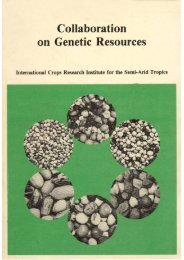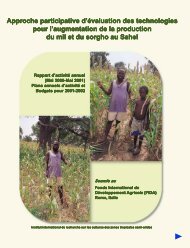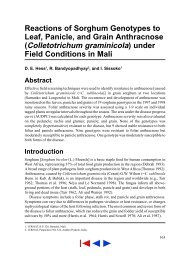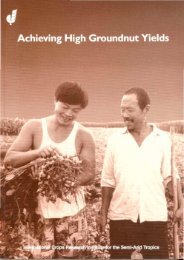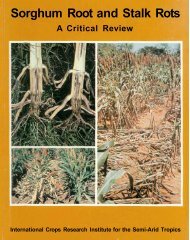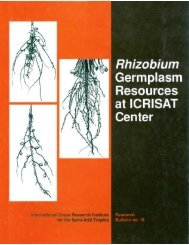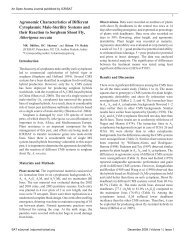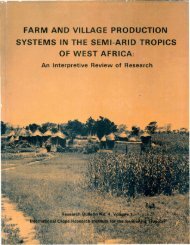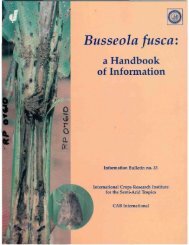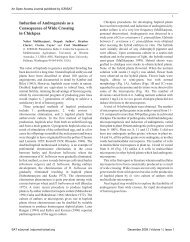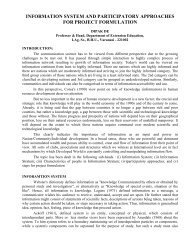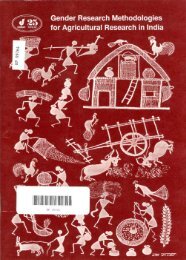Indigenous Practices for Soil and Water Conservation - Agropedia
Indigenous Practices for Soil and Water Conservation - Agropedia
Indigenous Practices for Soil and Water Conservation - Agropedia
You also want an ePaper? Increase the reach of your titles
YUMPU automatically turns print PDFs into web optimized ePapers that Google loves.
The Importance of Participation<br />
Since participation has been recognized as crucial to the success of rural development<br />
ef<strong>for</strong>ts, three main strains of innovation have emerged: farmer participatory<br />
research, participatory rural appraisal, <strong>and</strong> community participation.<br />
Farmer participatory research emphasizes the "farmer first" approach,<br />
where the st<strong>and</strong>ard transfer-of-technology package is replaced by choices from<br />
which farmers can select <strong>for</strong> their diverse <strong>and</strong> complex farming conditions. A<br />
function of the <strong>for</strong>mal research system is there<strong>for</strong>e to help generate such<br />
choices <strong>for</strong> farmers.<br />
Participatory rural appraisal, a relatively recent development, encourages<br />
rural people to undertake activities which earlier were done entirely by outsiders.<br />
An example is participatory mapping <strong>and</strong> modelling, where the role of<br />
the outsider now is to facilitate mapping by villagers themselves. This has<br />
revealed maps far more detailed <strong>and</strong> accurate than anything an outsider could<br />
quickly achieve. Farmers are empowered right from the start, with this approach,<br />
using their own appraisal <strong>and</strong> knowledge.<br />
Community <strong>and</strong> group participation includes such activities as group management<br />
of such common resources as natural resources, funds, <strong>and</strong> services;<br />
holding trials <strong>and</strong> experiments; <strong>and</strong> collective lobbying.<br />
These participatory approaches are particularly significant in the generat<br />
i o n of sustainable livelihoods, especially in view of the following aspects:<br />
1. The intensification <strong>and</strong> complication of farming systems, that increases<br />
w i t h population density.<br />
2. Farmers' own priorities are best expressed <strong>and</strong> understood by farmers<br />
themselves, <strong>and</strong> only through participation can their dem<strong>and</strong>s produce relevant<br />
research.<br />
3. Security is a precondition to a long-term perspective. Participation can enhance<br />
their security <strong>and</strong> encourage farmers to invest in long-term solutions.<br />
4. Farming conditions are <strong>for</strong>ever dynamic, <strong>for</strong>cing farmers to be alert, adaptable,<br />
a n d i n n o v a t i v e if they are to succeed. P a r t i c i p a t i o n can enhance such<br />
competence through individual <strong>and</strong> community action, effective communication,<br />
<strong>and</strong> analysis.<br />
Challenges <strong>for</strong> the 1990s<br />
The methods <strong>and</strong> approaches to SWC, which have so far been heavily researcher-oriented,<br />
m u s t now become more farmer-oriented, in t e r m s of behavior<br />
<strong>and</strong> attitude. <strong>Indigenous</strong> technology, <strong>and</strong> farmers' experience in adoption,<br />
innovation, <strong>and</strong> analysis must be recognized as valuable.<br />
The importance of m a k i n g SWC programs relevant must be understood by<br />
the major implementing authority—the government—if they are to achieve<br />
success on a large scale. For scaling up through government, the challenge is to<br />
find the right approaches that will encourage field-level officers to better appreciate<br />
farmers' practices <strong>and</strong> priorities so as to enable them to get more of<br />
what they want <strong>and</strong> need.<br />
10



